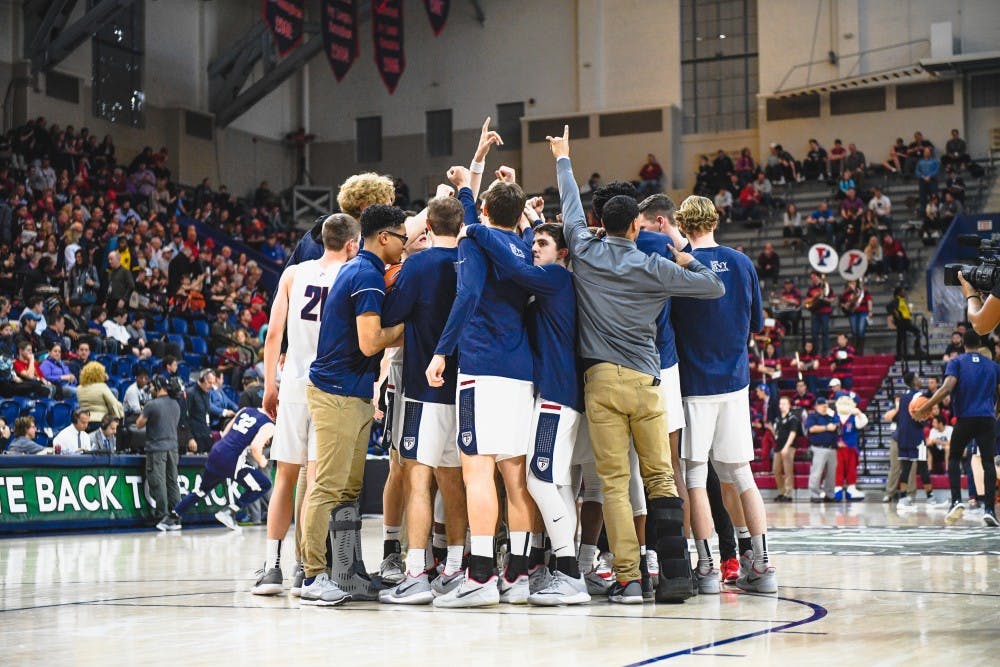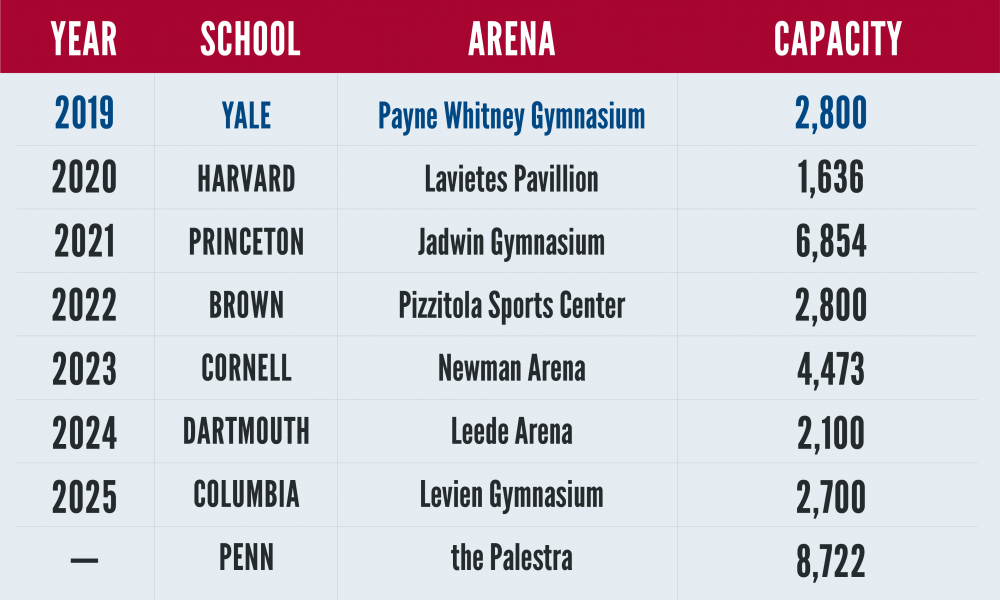
The Ivy League Tournament will be rotating around the different schools in the conference and will not return to the Palestra for at least seven years.
Credit: Chase SuttonThis could be the end of the Ivy League Basketball Tournaments as we know them.
The Ivy League announced Feb. 27 that the League’s basketball tournaments would rotate to every school in the conference through 2025. This is, simply, a complete travesty.
This decision is the ultimate swing and a miss for a conference that claims it still cares about national athletic relevance. They have taken the tournaments, a product that for its first two years was a complete success, and ruined it.
The Ivy League had the winning formula for its tournaments. It had an iconic venue, the “Cathedral of College Basketball,” in the Palestra. It had the tournaments' location, Philadelphia, a major and accessible city which also happens to be the most basketball-crazed city in America. And it had what executives for these tournaments desperately crave, a one-of-a-kind atmosphere.
The raucous environment at the championship game last year between Penn and Harvard would rival that of any Power Five conference tournament championship game, if not surpass it. What’s better is that tons of people saw the game and Penn fans storming the court by tuning in to ESPN, as it was the only men’s game on Selection Sunday. It was a brilliant move by the conference to showcase Ivy League basketball as the main event on a major network.
But the same powers who helped make that brilliant move have now squandered it. When one of the league’s best players, junior forward AJ Brodeur's immediate reaction is “Big yikes,” nothing else needs to be said.
The decision of rotating hosts does nothing to showcase Ivy League basketball on a national stage. It tarnishes the League’s brand by playing the championship game at a random arena every year that people have never heard of. At that point, it’s just another conference championship game and it’s no longer special.
It feels like this decision was made to appease all of the parties who have a seat at the table, to make each school happy by giving all of them an equal chance to host.
However, the problem is that all of the Ivy League arenas were not built equal. They’re squandering the league’s best asset, the Palestra, presumably because people thought that asset was too big of an advantage for Penn.
I’m not writing to argue why the tournaments should be held at the Palestra every year (which they should, by the way). In fact, I understand why it was moved to Yale this season. It felt like a short-term compromise while the League figured out the best long-term strategy for the tournament.
But this is the result we ended up with? Certain schools and cities don’t have the capacity to host these kinds of events, and if they do, there’s no guarantee the school hosts it well. A conference tournament in New York City (Columbia) screams logistical nightmare.
That’s not even counting the fans. Who is going to travel to Dartmouth in Hanover, N.H. when you don’t have skin in the game? What about Cornell? Between the eight teams, the coaches and staff for those eight teams, and the players’ families, there might not be any places left to stay.
If you don’t want to host it at Penn every year, that’s fine. Having the tournaments at a high-profile neutral site, such as the Prudential Center in Newark, N.J., actually makes a lot of sense. But it also probably costs a lot of money. It is hard to justify spending that much money when you won’t fill a 20,000-person arena and when you already have a team that plays in a great venue that is the perfect size (see Penn, Palestra).

Power Five conferences combat the home-court issue by having a fixed tournament site where they know many people will go and buy tickets, and then travel to different arenas every couple of years or so. The ACC Tournament, for example, is usually held at Greensboro Coliseum in Greensboro, N.C. Although it is technically a neutral site, does that give Duke and North Carolina an advantage when the tournament is held there? Of course it does. However, the ACC has recently held the tournament at the Barclays Center (Brooklyn, N.Y.) and Capital One Arena (Washington DC) before coming back to Greensboro this year.
While the Ivy League likely couldn’t afford these marquee venues, it could have taken a page from these big schools and not look like they’ve outsmarted themselves. Why not peg the Palestra as the host-site for most years and travel to a new major location every two or three years? It might be expensive given you might not sell out, but it could be affordable if it was only done every few years. TD Garden (in Boston) along with the aforementioned Barclays Center and Prudential Center would have made a lot of sense — too bad it’s too late.
In a few years, the Ivy League might realize that this decision killed their own tournaments. That it ruined an event that could have been really special and nationally relevant every single year. Now it’s just going to be another pair of championship games at a gym no one has heard of.
See you at Dartmouth in 2024?
I’ll watch it on TV, thanks.

CARTER THOMPSON is a College senior from Tallahassee, Fla. and a Sports Reporter for The Daily Pennsylvanian. He can be reached at dpsports@thedp.com.
The Daily Pennsylvanian is an independent, student-run newspaper. Please consider making a donation to support the coverage that shapes the University. Your generosity ensures a future of strong journalism at Penn.
Donate







